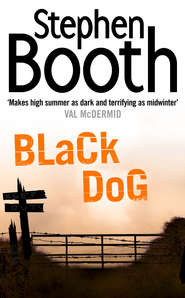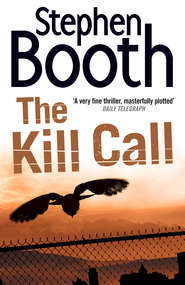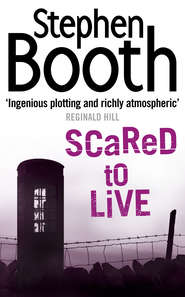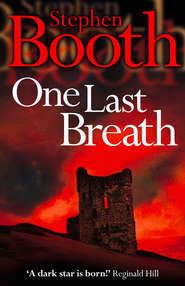По всем вопросам обращайтесь на: info@litportal.ru
(©) 2003-2024.
✖
Cooper and Fry Crime Fiction Series Books 1-3: Black Dog, Dancing With the Virgins, Blood on the Tongue
Автор
Год написания книги
2018
Настройки чтения
Размер шрифта
Высота строк
Поля
Helen sat on the side of her grandmother’s chair and put her arm around her thin shoulders.
‘It’s all right, Grandma. It’s understandable. There’s no need to upset yourself. What if I make some hot chocolate, then there might be something you can watch on TV until Granddad comes back.’
Gwen nodded and sniffed, and found another piece of tissue that was still intact to wipe her nose. Helen patted her shoulder and began to move towards the kitchen until her grandmother’s voice stopped her. It sounded harsh and full of fear, and trembling on the edge of despair.
‘What’s going to happen to Harry?’ she said. ‘Oh dear God, what will they do to Harry?’
7 (#ulink_f341fac4-dc3e-5205-bd9a-83b3b4f69dfe)
The mortuary assistant drew back the plastic sheet from the face with care. The relatives should never be allowed to see the injuries on the body, unless it was absolutely necessary. In this case, the face was bad enough, although it had been cleaned up as far as possible in the time they had been given. The maggots had been scooped away and bottled, the eyes cleaned and closed, the dried blood scraped off for testing. With the hair pushed back, the injuries to the side of the head were not readily visible.
‘Yes,’ said Graham Vernon, without hesitation.
‘You are identifying the remains as those of your daughter, Laura Vernon, sir?’ asked DCI Tailby.
‘Yes. That’s what I said, isn’t it?’
‘Thank you very much, sir.’
‘Is that it?’
‘It’s a necessary formality which allows the other procedures to get under way.’
The assistant was already drawing the sheet back over Laura’s face, returning her to the anonymity of the recently dead, until the postmortem examination could be completed.
‘Does one of your procedures involve catching my daughter’s murderer, by any chance, Chief Inspector?’ said Vernon, without taking his eyes from the body.
There was no need for Tailby to have been present in person when Graham Vernon identified his daughter’s body, but he saw it as a valuable chance to observe the reactions of relatives. He watched Vernon now as the man stepped away from the sheeted mound that had been his daughter. He saw his eyes linger with that familiar horrid fascination on the loose ridges and hollows of green plastic that concealed the dead girl’s face. Vernon’s hands moved constantly, touching his face and his mouth, smoothing his jacket, rubbing their soft fingers together in a series of involuntary gestures that could mean nervousness or barely concealed distress. His face told its own story.
Many parents and bereaved spouses had told Tailby that at this point their minds still refused to accept the reality of death. They would imagine their loved one sitting up suddenly and laughing at the joke, the sheet falling away from features restored to life and health. Was Graham Vernon thinking this now? Did he still see and hear a living Laura? And, if so, what was she telling him that made him look so afraid?
There was a fine line to tread in these cases. The family of a victim had to be treated with care and consideration. Yet ninety per cent of murders were ‘domestics’, in which a family member or close friend was responsible. Tailby was no longer moved by the various symptoms of distress displayed by relatives. It was a necessary ability in the job he did, this hardening of the emotions. Sometimes, though, he was forced to acknowledge that it had weakened him as a person; it was a long time since he had been able to form a close relationship.
‘You appreciate that we will need to talk to you and your wife again, sir,’ he said, when Vernon finally turned away.
‘There isn’t anything else I can tell you that I haven’t already.’
‘We need to know as much about Laura’s background as we can. We need to interview all her friends and associates again. We need to identify any links that we haven’t yet discovered. We need to trace her movements on the day she was killed. There’s a lot to be done.’
‘Just find Lee Sherratt!’ snapped Vernon. ‘That’s all you need to do, Chief Inspector.’
‘Enquiries are being made in that respect, sir.’
‘And what does that mean, for God’s sake?’
The two men walked out through the double doors into the corridor, attempting to leave behind the stink of antiseptic. Their footsteps echoed on a tiled floor as Tailby lengthened his stride to keep up with Vernon, who seemed to want to get away as quickly as possible.
‘We’ll find the boy, of course, sir. In time. I remain hopeful.’
Vernon stopped suddenly, so that Tailby couldn’t avoid bumping into him. They ended up almost eye to eye, though the detective was several inches taller. Vernon stared upwards with a ferocious scowl, his handsome face swollen into a grimace. His eyes were tired and shot with tiny red veins, and he had shaved unevenly on one side of his face.
‘I seem to remember you saying something like that before, Chief Inspector. Nearly two days ago. But that time you were assuring me that you would find my daughter.’
Tailby waited, not blinking in the face of Graham Vernon’s stare. ‘Yes, sir.’
‘But somebody else found her first. Didn’t they?’
Tailby recalled the painful scene earlier in the evening, when he had visited the Mount to break the news to the Vernons. He remembered the way that neither parent had shown any surprise on seeing him, only despair and resignation.
He also remembered Charlotte Vernon’s slow deterioration into sobbing hysteria, the retreat to a bedroom somewhere, and Graham Vernon’s phone call to their doctor. They had been both shocked and upset, of course. But they had reacted entirely separately – there had not been the smallest gesture of mutual support in the first moments after the bad news had been broken.
The two men were through the outside door and at the top of the mortuary steps when Tailby spoke again. To their right, through a screen of dark conifers, they could see the lighted windows of the medical wards of Edendale General Hospital, a series of modern two-storey brick buildings added to the rambling Victorian original. The lights looked cheerful and bright in contrast with the plain facade of the mortuary and its discreet car park.
‘Apart from the fact that he seems to have temporarily disappeared, there is no firm evidence at this stage to link Lee Sherratt with the death of your daughter,’ said the DCI reasonably.
‘That’s your job, surely, Chief Inspector. It’s up to you to find the evidence. I just hope you’re going to get on with it now.’
His voice had grown louder once they were free of the atmosphere of the mortuary. He had reverted to the brusque and impatient businessman. It had been interesting to observe the change in him in the presence of his daughter’s body. But the change had been short-lived.
‘All we know of Lee Sherratt, sir, is that he was employed by you as a gardener for the last four months. You gave him employment after he answered an advertisement in the window of Moorhay post office. Until then, he seems not to have known your family at all. His skills appear to have been of a labouring nature – digging and weeding, using a lawn mower and pushing a wheelbarrow rather than anything requiring horticultural expertise, since he has absolutely no training and no experience in that field. Am I right?’
‘That’s all we wanted – a labourer. My wife has all the expertise we needed.’
‘Indeed. And though he is twenty years old, this was the first job Sherratt had ever obtained, apart from a short spell as a warehouse assistant at the Tesco supermarket here in Edendale. He likes drinking, he admits he has had several casual girlfriends, and he is known to follow the fortunes of Sheffield Wednesday FC. It hardly seems much to reach a conclusion from, sir.’
‘Look, his father’s in prison for receiving stolen goods,’ said Vernon. ‘And the boy himself was involved in stealing a tourist’s car. What do you make of that?’
‘A criminal background, eh? Then why did you employ him, Mr Vernon?’
Vernon turned away, staring at the police car waiting in the car park. ‘I wanted to give him a chance. I don’t believe young men like that should be hanging around idle with nothing to do but get into trouble. Is that so wrong? Also, he looked like a strong youth who could cope with the heavy work. All right, I admit I made a mistake, but how could I have known what he would turn out to be?’
‘His mother says he’s just an ordinary young man who likes girls and beer and football.’
‘Crap!’ said Vernon. ‘Look a bit deeper, Chief Inspector. You’ll find Sherratt is a violent yob who was obsessed with my daughter. I warned him off, I sacked him. And a few days later she’s found attacked and murdered. Who else are you going to suspect?’
Vernon stalked off and got into the car that was waiting to take him home to Moorhay. But Stewart Tailby stood thoughtfully for a moment on the mortuary steps, considering the last question. On reflection, he was glad that Vernon hadn’t waited to be given the answer.
Diane Fry had got a lift back into Edendale with two traffic officers. She had been sent off duty for the night, while DCI Tailby himself had made the journey up to the Mount to ask the Vernons to identify the body.
As she sat behind the traffic men rustling in their yellow fluorescent jackets, she began to feel the familiar sensation of growing despondency as the tension left her and the adrenaline subsided. Very shortly she would have to walk away from the job and face up to the bleak reality of her personal life for another depressing evening.
‘Thanks, fellers!’ she called as the car dropped her in the station yard.
The driver waved a hand nonchalantly in her direction, but his partner turned to look at her as the Rover pulled away. He eyed her curiously and said something to the driver which Fry couldn’t make out. She dismissed it from her mind as not worth bothering about. She had seen female colleagues rushing like lemmings to destroy their own careers in the force because they had let totally petty incidents get out of proportion and fester in their minds.
First she walked up to the CID room. All the lights were on, and one or two of the computer screens were flickering with screen savers that looked like all the stars of the galaxy rushing past the flight deck of the Starship Enterprise. But the place was devoid of human life, not even a DC on night duty. Fry sat at her desk and wrote up her notes of the interview with Harry Dickinson. She knew that Tailby would be demanding them first thing, before the morning briefing, and she wanted them to be there for him before he had to ask. It would mean another small credit to her name – and it would also mean she would be available immediately for allocation to an enquiry team.
The report didn’t take her long. She was a competent typist, and her note-taking was accurate and legible. She hesitated for only a moment when she reached the end of the interview, but decided to include the final comment from Harry Dickinson for the sake of completeness. As she wrote that Dickinson had told DCI Tailby to ‘bugger off’, she was surprised to find herself smiling. She quickly changed the expression to a grimace, then a frown, looking round the empty office to be sure that no one was watching her. It wasn’t her style to laugh at senior officers – she had never joined in the irreverent banter and rude jokes of the canteen, either here or at West Midlands. She couldn’t understand what there was about Harry Dickinson’s comment that could have made her smile.











